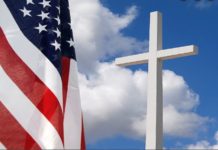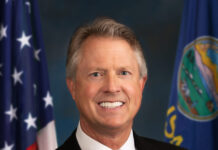We’re in the middle of a legal battle for Heather Rooks, a member of the Peoria Unified School Board in Arizona. She is being prohibited from quoting Bible verses during school board meetings.
Heather takes her responsibilities serving the parents and students in her community seriously. When she took office in January 2023, Heather began citing Scripture during her time for board member remarks. She found quoting the Bible to be calming and encouraging.
To be clear, the board’s agenda includes a brief comments period where individual board members may offer remarks of their own choosing.
But after receiving a threatening letter from an out-of-state activist group, the school board’s leaders and attorneys ordered Heather to stop quoting Scripture.
Watch this quick clip. You’ll see the head of the school board tell Heather she shouldn’t quote the Bible. Also, notice the reaction from people at the meeting:
Censoring religious speech betrays what religious liberty in America is all about. It’s unconstitutional. Public employees don’t have to “check their faith” at the door or abandon their convictions. The school district’s governing board should follow the law, do what’s right and allow Heather to express her faith.
Heather isn’t doing anything wrong or illegal. Quite the opposite. She’s actually embodying the best of our nation’s history and traditions.
If Presidents Can Quote the Bible, Why Can’t a School Board Member?
Quoting the Bible at public meetings is nothing new in America. Since the founding, elected officials have quoted sacred texts while carrying out their official duties. Many U.S. presidents, in their official capacity, have recognized or quoted religious texts they felt were appropriate for the occasion. These include Presidents Abraham Lincoln, Bill Clinton, John F. Kennedy, Ronald Reagan, all the way to President Joe Biden, just to name a few.
Our legal team pointed out in our lawsuit that when President Biden addressed the nation in 2021 after withdrawing American troops from Afghanistan, he said that military members “have drawn inspiration from the Book of Isaiah, when the Lord says, ‘Whom shall I send . . . who shall go for us?’”
President Franklin Roosevelt did something similar. On Jan. 25, 1941, he wrote a letter to the Armed Forces: “As Commander-in-Chief I take pleasure in commending the reading of the Bible to all who serve in the armed forces of the United States. Throughout the centuries men of many faiths and diverse origins have found in the Sacred Book words of wisdom, counsel and inspiration. It is a fountain of strength and now, as always, an aid in attaining the highest aspirations of the human soul.”
In her official capacity as a Peoria school board member, Heather—like our presidents and countless public leaders across the nation—exercised her constitutional right to quote a sacred text in a public setting. She too wants to be part of the longstanding tradition of government officials solemnizing public occasions, and the First Amendment declares that she has every right to do so.
















